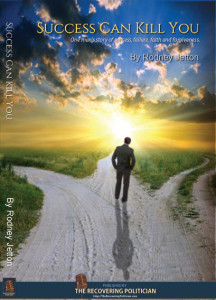By Jonathan Miller, on Fri Apr 25, 2014 at 9:35 AM ET
By Rod Jetton, on Thu Apr 24, 2014 at 12:05 PM ET  Click here to review and purchase The Recovering Politician Books is proud to publish its newest title, former Missouri House Speaker Rod Jetton, “Success Can Kill You: One Man’s Story of Success, Failure, Faith and Forgiveness.”
The book targeted to driven leaders, and points out how pride, flattery, bitterness and paranoia can have terrible consequences for those in charge of large organizations. Using personal examples, Rod warns readers about the dangers of letting success go to their heads. The book chronicles Rod’s meteoric rise from a young Marine officer to the second youngest House Speaker in Missouri state history. His political success made him a powerful force in the Republican Party and he was on the fast track to becoming Governor of Missouri, when his personal life exploded in a very public and humiliating fall.
On December 7, 2009, he was arrested for felony assault after a one-night stand with a woman he connected with on Facebook. Soon after that, he received a call from a former girlfriend telling him she was pregnant and he was going to be a father at the age of 42. Then, just a few weeks later, Rod found out he was the target of a grand jury investigation from his handling of a bill when he was Speaker of the Missouri House. Rod’s candid way of explaining his mistakes and pointing out the dangers of putting his career in front of his faith and family will be of great benefit to politicians, businessmen, church leaders and corporate executives focused on accomplishing their goals.
Click here to review and purchase.
Here’s an exclusive excerpt:
“Be not deceived, God is not mocked, for whatever a man soweth, that shall he also reap.” – Galatians 6:7
My bitterness and fighting had made me many political enemies across the state. Those enemies did everything they could to make sure the assault charges ended my political career. Over the last few years, I have had many supporters tell me I was set up by my political opponents. Let me set the record straight: I was not set up by anybody. I arranged to meet this lady on my own, and she was not part of any plan to get me. It is solely my fault and my responsibility.
But once my political opponents learned about the accusation, they took the information and did everything they could to make sure there was an investigation resulting in criminal charges. They used their political power to see me hang…however, I walked to the scaffold, gave them the rope, tied the knot, and put it around my own neck. Had I been in their shoes, I’m sure I would have done the same thing to them.
I remember talking to my good friend, Shannon Cooper, right after my arrest. In an effort to cheer me up he said, “Well Rod, at least things can only get better. You’re at rock bottom now, and the only way out is up.” While it did seem like my life had hit rock bottom, things were about to get a lot worse.
Two weeks after my arrest I was contacted by a lady I had dated that fall and was given some very sobering news. She told me she was pregnant and that I was going to be a daddy. Wow, that was a big news flash. My son was sixteen at the time and there I was at 42, about to be a new father.
To complicate the situation even more, she was still married. She was separated and in the process of getting a divorce when we started dating. Missouri law prohibits anyone who is pregnant from getting a divorce. They require that the parties wait until the child is born to do a DNA test to determine who the father is for child support reasons.
This woman came from a good Catholic family, and as you can imagine they were furious with both of us. The only thing they knew about me was what they saw on TV, which was not good. Her divorce, pregnancy and relationship with me were an embarrassment for them, and the whole complicated mess was like something on a soap opera.
For me, it meant another serious talk with my family. I will never forget telling my parents. When my mother heard the news, she gasped like someone had punched her in the gut. I could see the deep disillusionment in her eyes, but there was nothing I could do. What made it even worse for me was the realization that I was causing the woman who had done nothing but love and pray for me my whole life pain.
Once again my children were very kind and supportive. There are just no words to adequately describe how difficult it was to tell my two daughters and teenage son even more details about my whoring around. They were going to have a new sister or brother from someone they really didn’t even know, who was still married to another man.
 That was one very rough Christmas. I was so thankful for God’s forgiveness and so appreciative of my family and friends, but everything else was a total and complete mess. I didn’t know what to do about my girlfriend and the arriving baby. She didn’t have any place to live so I rented her an apartment to live in and took care of her medical bills. I asked her to marry me, and she said yes, so I made plans to marry her once the baby was born. She was a very nice lady, and I felt responsible to her and the child, but I was adamant on us living apart and not having sex until we were married. By then, I was scared to death of breaking any more of God’s commandments. That was one very rough Christmas. I was so thankful for God’s forgiveness and so appreciative of my family and friends, but everything else was a total and complete mess. I didn’t know what to do about my girlfriend and the arriving baby. She didn’t have any place to live so I rented her an apartment to live in and took care of her medical bills. I asked her to marry me, and she said yes, so I made plans to marry her once the baby was born. She was a very nice lady, and I felt responsible to her and the child, but I was adamant on us living apart and not having sex until we were married. By then, I was scared to death of breaking any more of God’s commandments.
Right after Christmas, I received more bad news. An old friend called to advise me of a federal grand jury investigation surrounding my handling of a bill regulating Missouri strip clubs during the 2005 legislative session. Over the years, many of my opponents had accused me of misconduct concerning this bill, but nothing had ever come of it. That fall a rumor about a new investigation had resurfaced, and my friend called to inform me that the FBI was moving forward with it.
I called my attorney who was helping me with the assault case, but he said he was not qualified to handle a federal case. He agreed to call the investigators and check on the situation. Later that week, he confirmed they were investigating the issue and two weeks after that I received a letter in the mail notifying me that I was the target of a federal grand jury investigation. The letter referenced several legal definitions of crimes they were looking into, but it all boiled down to bribery. The letter stated these charges could result in 20-25 years of prison time.
The accusation was that I took a $35,000 donation and promised to kill a bill regulating strip clubs in Missouri. I had been against the bill because it included a tax on strip clubs that I didn’t agree with, and the language regulating private businesses seemed unconstitutional to me. I had never been to a strip club and wasn’t trying to support them, but my disagreement with the language and my animosity toward Sen. Matt Bartle, the bill’s sponsor, were the reasons for my opposition.
Read the rest of…
EXCLUSIVE EXCERPT: Rod Jetton’s “Success Can Kill You”
By John Y. Brown III, on Wed Apr 16, 2014 at 10:00 AM ET
 I didn’t know Maddie Yates or her family but my heart goes out to them tonight. I didn’t know Maddie Yates or her family but my heart goes out to them tonight.
Maddie is the Louisville high school student who committed suicide yesterday after posting a video explaining her plan to kill herself and why.
The video is no longer on the internet but the transcript is. I just read the transcript and was drawn to this part:
“Remember how bad of a person I really am. I say awful things. Even if I don’t mean them, I say them. You don’t even want to know the things that I think; I am not a good person. I’m doing literally the whole world a favor.”
I was drawn to these words because I wish more adults would say from time to time –and say it so a young person can hear it:
“I say awful things that I don’t mean and later regret saying. I think thoughts that no good person would think. I sometimes wonder to myself how someone like me could ever be a ‘good person.’ But that doesn’t make me a bad person. It makes me about average–and the same can be said for everyone else who has thoughts like this. We just aren’t very good at talking openly about the uncomfortable parts of ourselves… but maybe one day we’ll get better at it.”
And I think if each of us adults would say something like that from time to time –and say it so a young person can hear it–I think we would be doing literally the whole world a favor.
By RP Nation, on Tue Apr 15, 2014 at 10:00 AM ET  I am passionate about healthcare for the people of Kentucky. That is why I am proud of the leadership Governor Steve Beshear has done with our Kentucky Kynect, which now covers more than 402,000 people in the Commonwealth. Governor Beshear recognized opportunity, and knew the remedy for at just the right time for the people he serves. I am passionate about healthcare for the people of Kentucky. That is why I am proud of the leadership Governor Steve Beshear has done with our Kentucky Kynect, which now covers more than 402,000 people in the Commonwealth. Governor Beshear recognized opportunity, and knew the remedy for at just the right time for the people he serves.
And that is why I am disappointed that Representative Andy Barr and Senator Mitch McConnell are still blind to the facts, maintaining even stronger attempts to undermine Kentucky Kynect for people who had no insurance.
I often say Kentucky moms like me get more done by noon than Congress gets done in a week. So when I learned Congressman Andy Barr has voted 19 times to repeal healthcare reform I was disappointed.
Barr, along with Mitch McConnell, voted to end Kynect and let insurance companies drop coverage, deny care and charge women more.
Barr has been in office as 6th District Congressman since January 2013. Since then, he has voted at least 19 times to repeal healthcare. His latest effort was just last week, when he cast his vote for the disastrous Barr/Ryan Budget, which would also change Medicare as we know it. During his career, he has taken more than $148,000 in contributions from the insurance industry, according to Opensecrets.org.
Overall, Congress has voted about 54 times to repeal the health care law. McConnell has even been criticized nationally for grossly distorting statistics, particularly when Governor Beshear’s office was reporting great success right here in Kentucky.
When I am in Congress, the families of Kentucky’s 6th District won’t have to be afraid of me serving special interests over their interests. And when it comes to their healthcare, I will protect Kentucky Kynect. When it comes to Andy Barr and me that is a big difference.
Elisabeth Jensen, as an executive of a non-profit and with deep experience in the business community, brings the tools and experience needed to get the economy working again. She is running for Congress to seek common sense, bi-partisan solutions to the challenges facing our country. See www.elisabethforkentucky.com for more information.
By John Y. Brown III, on Mon Apr 14, 2014 at 12:00 PM ET  The author at the Billy Joel concert with some nudnick and two beautiful women  The first two music albums that I fell in love with were Billy Joel’s The Stranger and Steely Dan’s Aja. I was 13 years old. Over time I came to like Aja better but initially The Stranger was my favorite. First favorite albums always have a special place in your heart and which is why I was so excited to attend my first Billy Joel concert at the YUM center last week. The first two music albums that I fell in love with were Billy Joel’s The Stranger and Steely Dan’s Aja. I was 13 years old. Over time I came to like Aja better but initially The Stranger was my favorite. First favorite albums always have a special place in your heart and which is why I was so excited to attend my first Billy Joel concert at the YUM center last week.
The first thing I noticed was Billy Joel looks a lot different today than he did when I was first introduced to him in 1977. He even joked when introducing himself that he was really Billy Joel’s father. A lot of time has passed since The Stranger was released –37 years to be exact. But as I was treated to a generously long lifetime of songs from the legendary Billy Joel I couldn’t help but notice that –at least in my opinion—almost all of Joel’s greatest songs came from The Stranger (1977) or earlier works.
The 37 years that followed had produced some memorable and even exceptional songs but none that rated, again in my opinion, as classics or truly extraordinary pieces of music.
 Which made me think to myself that perhaps in music—and other professions—the key is to have a huge creative burst in your late 20s and then you can coast the rest of your life by replaying your greatest hits, so to speak, to sell out crowds. In other words, I asked myself, Was Billy Joel and so many other of our greatest artists their own version of Orson Welles –who stunned the world with his prodigy and prodigiousness in his early career before falling relatively flat during the ensuing decades? Which made me think to myself that perhaps in music—and other professions—the key is to have a huge creative burst in your late 20s and then you can coast the rest of your life by replaying your greatest hits, so to speak, to sell out crowds. In other words, I asked myself, Was Billy Joel and so many other of our greatest artists their own version of Orson Welles –who stunned the world with his prodigy and prodigiousness in his early career before falling relatively flat during the ensuing decades?
But as I remained entertained and even entranced by Billy Joel I knew something more was at play. Perhaps for some artists they do flame out early and coast for many years after that. But that is not what we were witnessing with Billy Joel. Yes, his greatest music perhaps was written when he was a younger man but we were not watching a man who was past his prime. He had matured from a great song writer to one of the greatest entertainers of our time. Joel may have been at the apex of his creativity in his 20s but now in his 60s Joel was still peaking as a performer and master musician.
So, as we were slowly filing out after the concert, I wondered to myself what this all meant. Perhaps it was that great creativity and breakthrough originality are breathtaking to experience but like all things that take your breath away are hard to sustain. But real passion and dedication that lasts not for months or years –but for decades –and is nurtured while honing your life’s work, may not take your breath away, but does elicit something even greater—an awe and respect as well as a record of sustained excellence that is even rarer and more special than moments of genius.
 The author at the Billy Joel Louisville concert with some nudnick and two beautiful women I learned, I suppose, that the depth of our devotion is more profound than the height of our creativity. In music. And in life. The former can create one of the great albums of a generation. But the latter can establish one of the greatest entertainers of our lifetime. And made me glad that the Billy Joel I finally got to see live wasn’t the brilliant 28 year old at his creative flashpoint, who would have still been very exciting to see, but rather was the 65 year old master of his craft and consummate musical performer, who truly was amazing to behold. And who also taught me an important lesson about life.
By John Y. Brown III, on Tue Apr 8, 2014 at 12:00 PM ET If you are an adult and think you are a victim in life, you are sadly correct.
You are a victim of your own need to be a victim.
I am not saying we are not sometimes victimized. We most certainly are. People get raped, maimed, murdered, and harmed physically and emtionally in inmumerable and unthinkable ways. But those instances of being victimized are situational and do not permanently define us.
Unless, of course, we decide it is preferable to be defined as a victim than to get on with our life.
There are many enticing advantages to being a victim. When we are in that role we get pity, attention, compassion, concern, are the center of attention, less is expected of us and we expect less of ourseleves.
Not a bad deal.
 If you don’t mind spending your life “on the sidelines,” so to speak. We are like an injured athlete that sits with the team during the games but never gets to play and we are always pointing to our injury to explain why. If you don’t mind spending your life “on the sidelines,” so to speak. We are like an injured athlete that sits with the team during the games but never gets to play and we are always pointing to our injury to explain why.
We nurture and promote how we have been harmed until it really does define us.
It is as though we place a sign around our neck for all to see that says, “Wounded. Don’t expect much of me.”
But on our back is another sign that only others can see that says, “Because I choose to be a victim. And don’t expect much of myself.”
And the sign on our back doesn’t come off until we take off the sign that proclaims we are a victim –that we put on ourselves.
By Jonathan Miller, on Fri Apr 4, 2014 at 10:00 AM ET In my latest column for The Daily Beast, I discuss what I believe was the greatest speech of the 20th Century. Here’s an excerpt:
America is the story of improvisation.
From the ad hoc debates that framed our founding documents, to the native jazz syncopations that power our cultural soundtrack, to the deeply American notion that we all deserve second chances — our national fabric is woven together by motley patches of spontaneous innovation, creativity and reinvention.
It’s no wonder that we cherish the myth that our history’s greatest oration was scribbled furiously on the back of an envelope during a train ride to a Pennsylvania battlefield.
But while Lincoln’s words were more planned and deliberate, the most significant speech of the 20th century was indeed improvised, a spontaneous burst of prose and poetry in the immediate wake of national tragedy. And much as the Gettysburg Address forever redefined the Founders’ promise that “all men are created equal,” Bobby Kennedy’s extemporaneous eulogy to Martin Luther King, Jr. — delivered 46 years ago today — can offer a path toward a more just, compassionate second act for our country.
===
It was the evening of April 4, 1968, and a bitter, black nightfall had descended on one of our nation’s grayest days.
Rejecting the impassioned urging of local officials who feared imminent violence, Senator Robert F. Kennedy ascended the back of a flatbed truck in a vacant lot, surrounded by dilapidated public housing units, in the heart of the Indianapolis ghetto. Hair tussled, wearing the old overcoat of his fallen brother, Bobby stepped up to a single microphone before a growingly angry African-American audience that had waited hours in the freezing cold to confirm what many had already heard: that Martin Luther King, Jr. — their Voice — had been permanently silenced. And without notes, speaking directly from his heart, a heart that ached from an unimaginable half-decade of grief — grief for a brother, for a comrade-in-peace, for a nation in turmoil — Robert Kennedy improvised the speech of his life.
Click here to read “RFK and the Healing Power of Improvisation.”
And watch RFK’s moving oratory below:
By Michael Steele, on Wed Apr 2, 2014 at 10:00 AM ET Awesome piece by Roger Simon in today’s Politico on recovering politician Michael Steele:
Steele, who is a resident fellow at the university’s Institute of Politics, manages to traverse the entire breadth of the Midway before the inevitable happens: A passing car comes to halt, and the driver lowers her passenger window and hails Steele as an old friend, even though they have never met.
While Steele was once the (first black) lieutenant governor of Maryland and the (first black) chairman of the Republican National Committee, today he is far better known than he was then. This is largely due to the airtime he gets as an MSNBC analyst and his appearances on “Real Time with Bill Maher” and “The Colbert Report.”
He is outgoing, bright, magnetic, recognized on streets and in airports and is the one thing he was not while he ran the Republican Party: popular.
“I am the most misunderstood man in politics,” Steele tells me.
Steele was elected to a two-year term as Republican Party chairman on Jan. 30, 2009. It seemed like a good idea at the time. Barack Obama had moved into the White House, and a lot of people were talking about a “post-racial” America. Nancy Pelosi was running the House, Harry Reid was running the Senate and it didn’t seem as if the Republican message was selling all that well.
So maybe it was time for a change.
Except Steele’s election took six ballots and, though Steele had conservative Republican credentials, the reaction of some of the party kingpins ranged from displeasure to dismay. And then there was the race thing. Maybe the country was not so post-racial after all.
“After I was elected chairman, there were some people who refused to shake my hand,” Steele says of some Republican bigwigs.
He was a different kind of chairman. He got involved in controversies that earned him the wrath of Sen. John McCain (not that hard a thing to do, actually) and made a series of statements that some found baffling.
He said the war in Afghanistan was a war “of Obama’s choosing” and that he was going to tell local Republican chairmen, “Don’t think this is a country club atmosphere where we sit around drinking wine and eating cheese and talking amongst ourselves. If you don’t want to drill down and build coalitions to minority communities, then you have to give that seat to someone who does.”
Some of his ideas were actually pretty good. He said he wanted an “off the hook” public relations offensive to reach out to “the young, Hispanic, black, a cross section” and apply party principles “to urban-suburban hip-hop settings.”
This earned him the wrath of Rush Limbaugh, which could be considered a badge of honor, but Steele was the chairman of the Republican Party, a party that didn’t actually think of itself as being that “off the hook.”
Click here to read the full piece.
By Jeff Smith, on Sat Mar 29, 2014 at 1:51 PM ET
By John Y. Brown III, on Tue Feb 25, 2014 at 12:00 PM ET Memories….of my memory….remembering things….that I didn’t really remember….but thought I did…but was something else.
Seeing someone on the street late last week I said to them…
“Hey there! How are you? I was just talking about you to someone the other day….Oh, who was it…Actually it was about a month ago not the other day. Who was it I was talking to? I can’t believe I can’t remember. Oh, it wasn’t about you but something you were doing.
What…you know ….that, umm, what is the name of that charity you are involved with.
Or not charity, but project you are on the board of. The, um, the…..Oh, I remember now. It was about someone who wanted me to introduce you to them because they wanted to discuss the project with you.
 That’s what it was….and, well, darn it, I told them I would introduce you two and I just forgot all about it until just now. That’s what it was….and, well, darn it, I told them I would introduce you two and I just forgot all about it until just now.
I’m glad I ran into you so it jogged my memory!”
|
The Recovering Politician Bookstore
|















